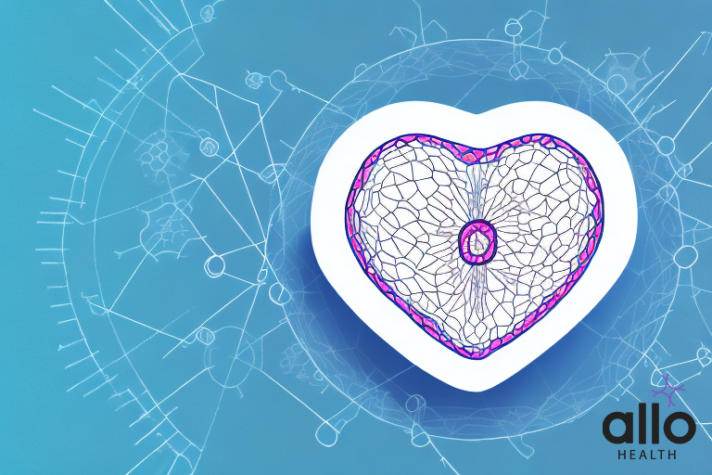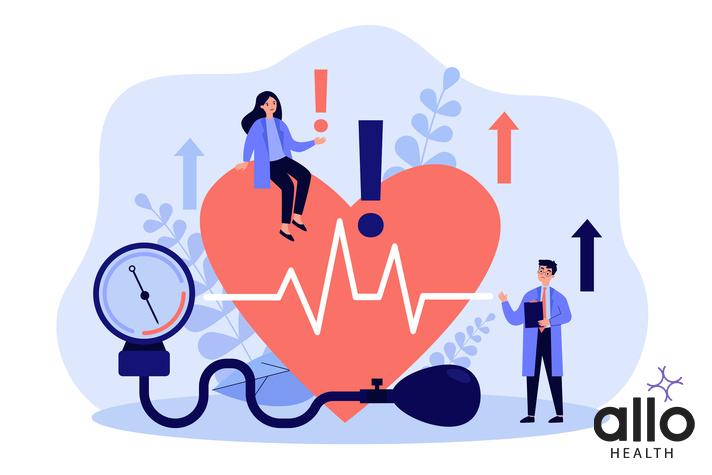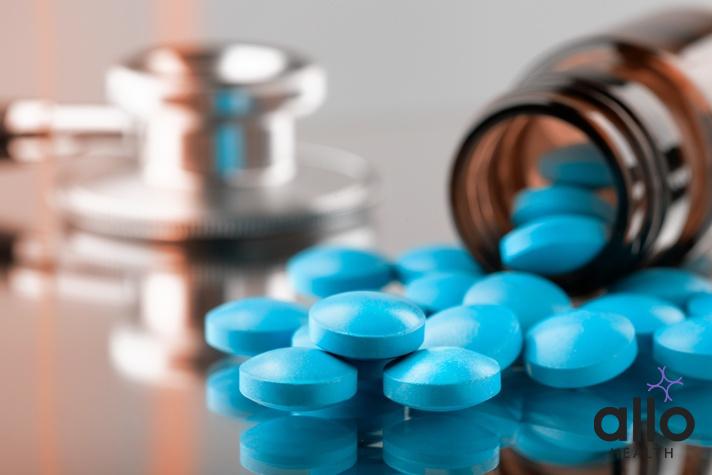Exploring The Effects Of Tadalafil On The Heart

Allo Health is dedicated to personalized well-being, offering support and trusted information tailored to individual health goals. The platform emphasizes human-generated content, led by a distinguished medical team of experts, including physicians and sexual health specialists. Their commitment to credibility involves rigorous fact-checking, authoritative research, and continuous updates to ensure accurate, up-to-date information. Allo Health's unique approach goes beyond conventional platforms, providing expert-led insights and a continuous commitment to excellence, with user feedback playing a crucial role in shaping the platform's authoritative voice.

Dr.Sushma.V completed MBBS degree from BGS GIMS,bangalore
Why This Was Upated?
Our experts continually monitor the health and wellness space, and we update our articles when new information became available.
Updated on 05 June, 2024
- Article was updated as part of our commitment to diversity, equity, and inclusion.

"The following blog article provides information about a drug or brand name drug and its potential effects or benefits. However, it is crucial to understand that this information is intended for general educational purposes only and should not be considered a substitute for professional medical consultation. It is highly recommended to consult with a qualified healthcare professional before making any decisions regarding medication, treatment, or healthcare management.
Book consultation
Individuals have unique medical conditions, and the information provided in this article may not be applicable to everyone. Only a qualified healthcare provider can evaluate your specific medical situation, taking into account your medical history, conducting appropriate tests, and providing personalized advice and recommendations. They are equipped to make informed decisions tailored to your individual needs.
It is crucial to emphasize that self-diagnosis, self-medication, or disregarding medical advice can have serious health consequences. This article may reference specific brand names or drugs for illustrative purposes. Mention of these names does not imply endorsement, recommendation, or guarantee of their efficacy or safety. The choice of medication should be based on discussions and individualized guidance from a healthcare professional who has a comprehensive understanding of your medical condition.
"Tadalafil is a medication commonly prescribed for the treatment of erectile dysfunction (ED). But did you know that this medication may also have potential benefits for heart health? In this article, we will explore how tadalafil works in the body and its impact on the heart and blood vessels.
What Is Tadalafil?
Tadalafil is a medication primarily used to treat erectile dysfunction (ED), pulmonary arterial hypertension (PAH) and symptoms of benign prostatic hyperplasia (BPH). It belongs to a class of drugs known as phosphodiesterase type 5 (PDE5) inhibitors.
Here’s a detailed breakdown of its uses and mechanisms:
- Erectile Dysfunction (ED):
- Tadalafil is widely known for its effectiveness in treating erectile dysfunction, a condition where a man struggles to achieve or maintain an erection sufficient for sexual activity.
- It works by inhibiting the enzyme phosphodiesterase type 5 (PDE5), which leads to increased levels of cyclic guanosine monophosphate (cGMP). Elevated cGMP levels relax the smooth muscles in the penis, promoting increased blood flow and facilitating an erection.
- Pulmonary Arterial Hypertension (PAH):
- Tadalafil is also used to treat pulmonary arterial hypertension, a condition characterized by high blood pressure in the arteries that supply the lungs.
- In PAH, tadalafil acts by dilating the pulmonary arteries, reducing the workload on the heart and improving exercise capacity.
- Benign Prostatic Hyperplasia (BPH):
- Tadalafil is approved for treating the symptoms of benign prostatic hyperplasia, a condition where the prostate gland becomes enlarged, leading to urinary concerns.
- It works by relaxing the muscles in the prostate and bladder, allowing for better urine flow.
Points to consider:
- Onset and Duration: Tadalafil has a longer duration of action compared to some other PDE5 inhibitors, such as sildenafil. It can provide relief for up to 36 hours, earning it the nickname “the weekend pill.”
- Brand Names: Tadalafil is commonly known by its brand name Cialis, which is available in various formulations and dosages.
- Prescription: Tadalafil is a prescription medication, and its use should be supervised by a healthcare professional. It’s crucial to follow the prescribed dosage and instructions.
- Side Effects: Like any medication, tadalafil may cause side effects, including headache, back pain, muscle aches, flushing, and nasal congestion. Serious side effects are rare but may include sudden vision loss or hearing loss.
It’s essential to consult with a healthcare provider before using tadalafil, especially if you have pre-existing medical conditions or are taking other medications, as interactions can occur.
Tadalafil Uses & Benefits
Tadalafil is a medication with several uses and benefits, primarily associated with the treatment of erectile dysfunction (ED), pulmonary arterial hypertension (PAH), and symptoms of benign prostatic hyperplasia (BPH). Here’s a detailed overview of its uses and associated benefits:
- Treatment of Erectile Dysfunction (ED):
- Benefit: Tadalafil is widely prescribed for men experiencing erectile dysfunction, a common condition where achieving or maintaining an erection suitable for sexual activity is challenging.
- Mechanism of Action: Tadalafil inhibits the enzyme phosphodiesterase type 5 (PDE5), leading to increased levels of cyclic guanosine monophosphate (cGMP). This results in smooth muscle relaxation in the penis, increased blood flow, and improved erectile function.
- Management of Pulmonary Arterial Hypertension (PAH):
- Benefit: Tadalafil is used to treat pulmonary arterial hypertension, a condition characterized by elevated blood pressure in the arteries supplying the lungs.
- Mechanism of Action: Tadalafil helps dilate the pulmonary arteries, reducing resistance and pressure. This eases the workload on the heart and enhances exercise capacity in individuals with PAH.
- Alleviation of Benign Prostatic Hyperplasia (BPH) Symptoms:
- Benefit: Tadalafil is approved for addressing the symptoms of benign prostatic hyperplasia, a non-cancerous enlargement of the prostate gland that can cause urinary difficulties.
- Mechanism of Action: Tadalafil relaxes the smooth muscles in the prostate and bladder, improving urine flow and alleviating symptoms like frequent urination, urgency, and incomplete emptying of the bladder.
- Extended Duration of Action:
- Benefit: Tadalafil is known for its extended duration of action compared to other phosphodiesterase inhibitors. It can remain effective for up to 36 hours, allowing for more flexibility in the timing of sexual activity.
- Improved Quality of Life:
- Benefit: By addressing conditions like ED, PAH, and BPH, tadalafil can contribute to an improved quality of life for individuals experiencing these health concerns.
While tadalafil offers these benefits, it may not be suitable for everyone. Individuals with certain medical conditions, taking specific medications, or having a history of cardiovascular concerns should consult with a healthcare professional before using tadalafil. Additionally, the prescribed dosage and usage instructions should be followed strictly to ensure both effectiveness and safety.

Tadalafil Side Effect & Precautions
Tadalafil, like any medication, can cause side effects, and it’s important to be aware of them. Additionally, there are certain precautions and contraindications that individuals should consider before using tadalafil. Here’s a detailed overview:
Common Side Effects of Tadalafil:
- Headache: Some individuals may experience headaches as a common side effect.
- Back Pain and Muscle Aches: Pain in the back and muscles are reported side effects.
- Flushing: A sensation of warmth or redness in the face and neck may occur.
- Nasal Congestion: Stuffy or runny nose may be observed.
- Indigestion: Gastrointestinal concerns such as indigestion or upset stomach can occur.
Less Common Side Effects:
- Vision Changes: While rare, tadalafil has been associated with changes in color vision or blurred vision. In extremely rare cases, sudden vision loss can occur.
- Hearing Loss: Some individuals may experience a decrease or loss of hearing, although this is rare.
- Priapism: A prolonged and painful erection lasting more than four hours requires immediate medical attention.
Precautions and Contraindications:
- Cardiovascular Conditions: Individuals with a history of cardiovascular disease, including recent heart attack or stroke, should consult their healthcare provider before using tadalafil.
- Hypotension: Tadalafil can cause a drop in blood pressure. It is contraindicated in individuals taking nitrates or alpha-blockers, as the combination may lead to a significant decrease in blood pressure.
- Liver and Kidney concerns: Individuals with liver or kidney concerns may need dosage adjustments, and caution is advised.
- Priapism Risk Factors: Individuals with conditions predisposing them to priapism (prolonged erection), such as sickle cell anemia or multiple myeloma, should use tadalafil with caution.
- Vision and Hearing concerns: Tadalafil should be used cautiously in individuals with pre-existing vision or hearing concerns.
- Drug Interactions: Tadalafil can interact with certain medications, including nitrate-containing drugs, alpha-blockers, antihypertensives, and some antifungal and antibiotic medications. A healthcare provider should be informed of all medications being taken.
- Allergies: Individuals with known allergies to tadalafil or its components should avoid its use.
- Alcohol and Grapefruit Juice: Excessive alcohol consumption and grapefruit juice may interact with tadalafil and should be avoided or limited.
Pregnancy and Breastfeeding:
Tadalafil is not indicated for use in women and should not be taken during pregnancy. It is not known whether tadalafil passes into breast milk, so breastfeeding is not recommended while using this medication.
Consultation with Healthcare Provider:
Before starting tadalafil or any medication, it’s crucial to have a thorough discussion with a healthcare provider. They can assess individual health conditions, potential interactions with other medications, and determine the most appropriate dosage.
Any unusual or severe side effects should be promptly reported to a healthcare professional. If experiencing a medical emergency, seek immediate medical attention. It’s essential to use medications responsibly and only under the guidance of a qualified healthcare professional.
Exploring The Effects Of Tadalafil On The Heart
Tadalafil, a phosphodiesterase type 5 (PDE5) inhibitor, primarily affects the cardiovascular system by modulating the cyclic guanosine monophosphate (cGMP) pathway. Here’s an exploration of how tadalafil interacts with the heart and its effects:
- Mechanism of Action: Tadalafil works by inhibiting the PDE5 enzyme, which is responsible for breaking down cGMP. By inhibiting PDE5, tadalafil increases the concentration of cGMP in smooth muscle cells, leading to vasodilation (relaxation of blood vessels) and improved blood flow.
- Vasodilation and Blood Pressure:
- The primary cardiovascular effect of tadalafil is vasodilation. This relaxation of blood vessels allows for increased blood flow, which is beneficial in the treatment of conditions such as erectile dysfunction, pulmonary arterial hypertension (PAH), and symptoms of benign prostatic hyperplasia (BPH).
- While this vasodilatory effect is generally well-tolerated, it can also lead to a decrease in blood pressure. Therefore, caution is advised, especially in individuals with pre-existing hypotension or those taking antihypertensive medications.
- Interaction with Nitrates: Tadalafil is contraindicated in individuals taking nitrates, commonly prescribed for chest pain (angina). The combined use of tadalafil and nitrates can lead to a significant drop in blood pressure, posing a risk of hypotension.
- Effects on Heart Rate: Tadalafil is not typically associated with significant changes in heart rate. But, individuals with pre-existing cardiovascular conditions should use it with caution, and any unusual symptoms should be promptly reported to a healthcare provider.
- Cardiovascular Conditions: Before prescribing tadalafil, healthcare providers consider the patient’s cardiovascular health. Individuals with a history of cardiovascular diseases, recent heart attacks, or strokes may be at increased risk, and caution is advised.
- Exercise Capacity in PAH: In the treatment of pulmonary arterial hypertension (PAH), tadalafil’s vasodilatory effects can help improve exercise capacity by reducing pulmonary vascular resistance and enhancing blood flow to the lungs.
- Long Duration of Action: Tadalafil is known for its extended duration of action compared to other PDE5 inhibitors. The prolonged effect may influence the timing of sexual activity and reduce the need for strict adherence to a specific dosing schedule.
- Monitoring and Consultation: Regular monitoring and consultation with a healthcare provider are essential for individuals using tadalafil, especially those with underlying cardiovascular conditions. Adjustments to the medication or dosage may be necessary based on individual responses and health status.
It’s crucial for individuals to communicate openly with their healthcare providers about their medical history, existing cardiovascular conditions, and any medications they are taking. Only a qualified healthcare professional can assess the potential risks and benefits of tadalafil for an individual, taking into account their overall health and specific medical circumstances

Tadalafil Drug Interactions
Tadalafil, like many medications, can interact with other drugs, potentially affecting their effectiveness or increasing the risk of side effects. It’s important to inform your healthcare provider about all medications, supplements, and herbal products you are taking to ensure safe and effective use of tadalafil. Here is a detailed overview of some of the notable drug interactions with tadalafil:
- Nitrates:
- Interaction: Concomitant use of tadalafil with nitrates or nitric oxide donors (commonly used to treat chest pain or angina) is contraindicated. Both tadalafil and nitrates can cause vasodilation, leading to a significant drop in blood pressure. This combination can result in a life-threatening condition called hypotension.
- Alpha-Blockers:
- Interaction: Tadalafil can enhance the hypotensive effects of alpha-blockers, which are medications often prescribed for prostate enlargement or high blood pressure. To minimize the risk of low blood pressure, the use of alpha-blockers and tadalafil should be carefully managed, and dose adjustments may be necessary.
- Antihypertensive Medications:
- Interaction: Tadalafil can potentiate the hypotensive effects of antihypertensive medications. Caution is advised when combining tadalafil with other drugs that lower blood pressure to avoid excessive drops in blood pressure.
- Cytochrome P450 3A4 Inhibitors:
- Interaction: Tadalafil is metabolized in the liver by the enzyme cytochrome P450 3A4. Drugs that inhibit this enzyme, such as ketoconazole, itraconazole, ritonavir, clarithromycin, and erythromycin, can increase tadalafil levels in the blood. This may lead to an increased risk of side effects.
- Cytochrome P450 3A4 Inducers:
- Interaction: Drugs that induce the cytochrome P450 3A4 enzyme, such as rifampin, can decrease tadalafil levels in the blood. This may reduce the effectiveness of tadalafil, and dose adjustments may be needed.
- Grapefruit Juice:
- Interaction: Grapefruit juice inhibits the activity of the cytochrome P450 3A4 enzyme, potentially increasing tadalafil levels in the blood. It is advisable to avoid consuming large quantities of grapefruit juice while using tadalafil.
- HIV Protease Inhibitors:
- Interaction: HIV protease inhibitors, such as ritonavir, can increase tadalafil levels. Dosage adjustments may be necessary when tadalafil is used in combination with these drugs.
- Other PDE5 Inhibitors:
- Interaction: Concurrent use of multiple phosphodiesterase type 5 (PDE5) inhibitors, such as sildenafil (Viagra) or vardenafil (Levitra), is not recommended due to the additive effects on cGMP levels and the potential for increased side effects.
It’s essential to communicate openly with your healthcare provider about all medications you are taking, including prescription drugs, over-the-counter medications, supplements, and herbal products. This information allows healthcare providers to make informed decisions about the safety and effectiveness of tadalafil in your specific case. Always follow your healthcare provider’s recommendations and inform them of any changes in your medication regimen.
Most Asked Questions
-
How does Tadalafil affect the heart?
Tadalafil primarily impacts the cardiovascular system by inhibiting the phosphodiesterase type 5 (PDE5) enzyme. This inhibition leads to increased levels of cyclic guanosine monophosphate (cGMP), causing vasodilation and improved blood flow. While this effect is generally well-tolerated, individuals with pre-existing cardiovascular conditions should use tadalafil cautiously.
-
Does Tadalafil influence blood pressure?
Yes, tadalafil can cause a decrease in blood pressure due to its vasodilatory effects. Individuals on antihypertensive medications or those with pre-existing hypotension should exercise caution. Concomitant use with nitrates is contraindicated as it may lead to a significant drop in blood pressure.
-
Can Tadalafil affect heart rate?
Tadalafil is not typically associated with significant changes in heart rate. But, individuals with underlying heart conditions should use it with caution, and any unusual symptoms should be promptly reported to a healthcare provider.
-
How does Tadalafil impact exercise capacity in pulmonary arterial hypertension (PAH)?
In the treatment of PAH, tadalafil's vasodilatory effects help improve exercise capacity by reducing pulmonary vascular resistance. This enhances blood flow to the lungs, reducing the workload on the heart and improving overall cardiovascular function.
-
Is Tadalafil safe for individuals with cardiovascular diseases?
Tadalafil use in individuals with cardiovascular diseases requires careful consideration by healthcare providers. Those with a history of recent heart attacks, strokes, or other cardiovascular concerns should consult their healthcare provider before using tadalafil, as it may pose potential risks. Regular monitoring and communication with a healthcare professional are crucial for safe usage.






































